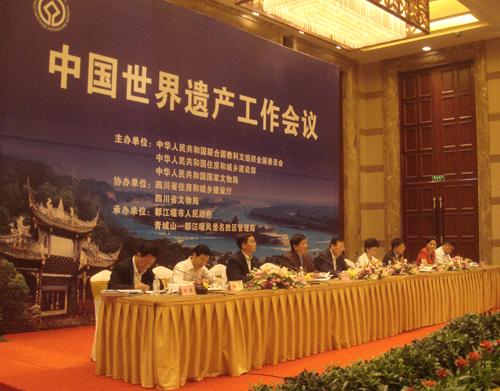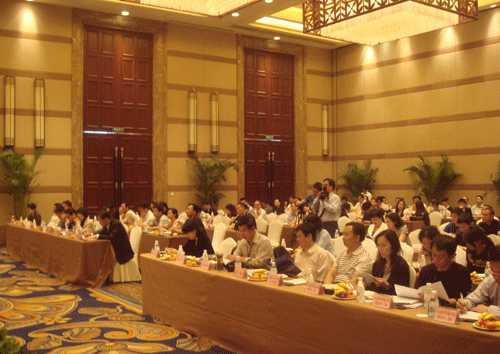| 2011 National Working Conference on World Heritage Held in Du Jiangyan |
| PublishDate:2011-05-16 Hits:2485 |
Working Conference on World Heritage in China, hosted by Chinese National Commission for UNESCO (NATCOM), Ministry of Housing and Urban-Rural Development (MOHURD) and State Administration of Cultural Heritage (SACH), was opened in Du Jiangyan city on May 5th to 6th. More than 150 people attended the meeting, including HAO Ping, Vice Minister of Education and Director of NATCOM, SHAN Jixiang, Director of SACH, LI Rusheng, Deputy Director-General of Department of Urban Construction, DU Yue, Deputy Secretary-General of NATCOM and representatives from heritage administrations around the country. Prof. ZHOU Jian and Dr. LI Xin from WHITRAP Shanghai were present by invitation. This conference, held in the first year of the Twelfth Five-Year Plan of China and coinciding with the 40th anniversary of Convention Concerning the Protection of the World Cultural and Natural Heritage, was a high-level national conference that called for new ideas to develop Chinese world heritage course in the current global situation, and discussed on the commemorative plan for the 40th birthday of the Convention. With an eye on problems faced by China in its heritage application and conservation process, Vice Minister HAO Ping has drawn up a general plan for the management in this regard in the future, which listed five principles to follow. First, we should set up correct ideas about heritage conservation, and change preconceived concepts by giving priority to conservation, quality and comprehensive capacity instead of the original emphasis on application, quantity and reputation. Second, we should improve the heritage management by accomplishing revision of the tentative list and second round of world heritage monitoring. Third, we should take use of the results of higher education institutes and scientific institutions to promote research on heritage conservation. Fourth, we should strengthen the coordinative and cooperative mechanism between administrative departments. Fifth, we should increase the international exchange and cooperation in world heritage area. Sixth, we should enhance the publicity to get more people involved and popularize education among general public. SHAN Jixiang pointed out the guidelines of heritage work during the 12th-five years plan period in his speech. First, expanding money input in heritage management, with an estimated 8 billion RMB investment in heritage conservation, giving priority to three types of projects: Great Wall, imperial architecture of Ming and Qing Dynasty and large grotto temples. Second, establishing monitoring and warning mechanism to exercise dynamic management of world heritage sites. Pilot projects will be accomplished within this year, and gradually get initiated around the country during the 12-year period. Third, improving institution management by establishing World Heritage Monitoring Center under Chinese Academy of Cultural Heritage and adding Department of World Heritage under SACH. On the seminar on June 6th, HOU Weidong, Vice-Dean of Chinese Academy of Cultural Heritage, and Professor Liang Yongning from Kunming University of Science and Technology, gave academic lectures of “Disaster Prevention and Reduction of World Cultural Heritage” and “the Construction of Chinese Natural Heritage Framework in the Context of Heritage Global Strategy”. After enumerating the hazards risk faced by cultural heritage, Mr. HOU suggested three aspects to improve the capacity of disaster prevention: better understanding of the nature of both disasters and heritage, and subsequent overlap analysis. Prof. LIANG in his speech analyzed the application of Chinese world heritage with a new approach in the context of UNESCO global strategy. By the end of the conference, participants paid a field trip to the reconstructed Du Jiangyan scenic area after the earthquake. |
- News | WHITRAP Shanghai and CNR-ISPC bilateral meeting
- News | WHITRAP meets Cité de l’Architecture et du Patrimoine
- WHITRAP Hosting "Workshop on Preliminary Assessment for National Focal Points of the Asia Region" in Chengdu
- WHITRAP Shanghai meets UNESCO
- INTERNATIONAL CONFERENCE PRELIMINARY ANNOUNCEMENT & CALL FOR PAPERS
- Observation of the 46th Session of the World Heritage Committee
Copyright © 2009-2012 World Heritage Institute of Training and Research-Asia and Pacific (shanghai)




